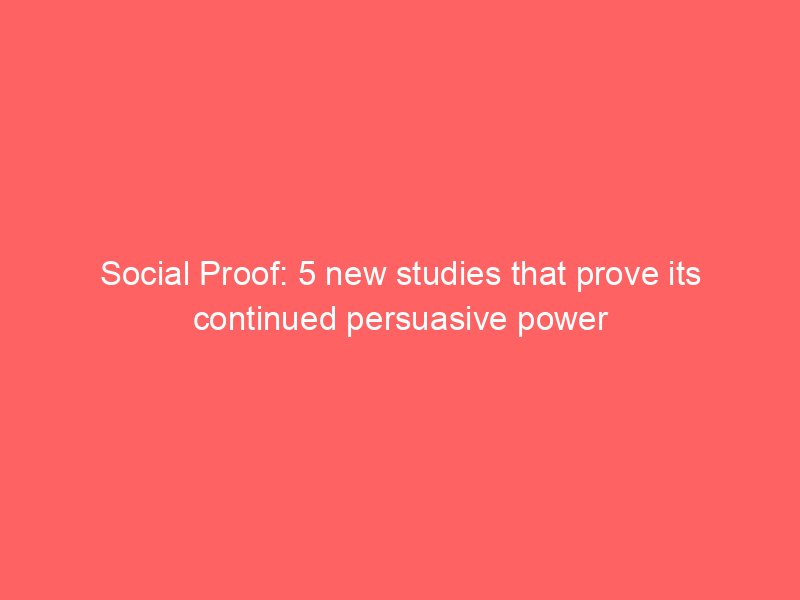[ad_1]
Social proof has become a ubiquitous marketing tactic in recent years. From customer reviews and testimonials to influencer endorsements and social media likes, brands are constantly leveraging social proof to persuade consumers to make a purchase. However, with the sheer volume of social proof being thrown at consumers on a daily basis, it’s easy for marketers to become desensitized to its power.
In his book “Influence: The Psychology of Persuasion,” Robert Cialdini identified social proof as one of the six key principles of persuasion. Social proof is the idea that people will follow the actions of others, especially if they are uncertain about what to do. This principle has been proven time and time again to be a powerful tool in influencing consumer behavior.
To remind marketers of the persuasive power of social proof, let’s take a look at five new studies that highlight its effectiveness.
1. The Power of Customer Reviews
A study conducted by BrightLocal found that 88% of consumers trust online reviews as much as personal recommendations. Customer reviews are a form of social proof that can significantly influence purchasing decisions. Positive reviews can build trust and credibility for a brand, while negative reviews can deter potential customers. It’s important for brands to actively encourage and monitor customer reviews to leverage social proof effectively.
2. Influence of Influencers
Influencer marketing has exploded in popularity in recent years, with brands partnering with social media personalities to promote their products. A study by Influencer Marketing Hub found that 63% of consumers trust influencer messages more than brand messages. By leveraging influencers as social proof, brands can reach a wider audience and tap into the trust and credibility that influencers have built with their followers.
3. Social Proof in E-commerce
A study by Spiegel Research Center found that displaying social proof, such as star ratings and customer reviews, can increase conversion rates by up to 270%. E-commerce websites that prominently feature social proof signals can instill confidence in consumers and lead to more conversions. Brands should focus on showcasing social proof on product pages and throughout the checkout process to maximize its impact.
4. The Influence of Social Media Likes
A study by Georgia Tech found that social media likes can influence consumer behavior, even when the likes are from strangers. The study found that people were more likely to like a post if they saw that others had already liked it. This demonstrates the power of social proof in shaping online interactions and influencing consumer decisions. Brands should strive to generate likes and engagement on social media to leverage social proof effectively.
5. The Role of Testimonials
Testimonials are a classic form of social proof that can be incredibly persuasive. A study by Vendasta found that 92% of consumers read online reviews when considering a purchase, and 88% trust reviews as much as personal recommendations. Testimonials from satisfied customers can help build trust and credibility for a brand, as well as provide valuable insights for potential customers. Brands should actively collect and showcase testimonials to leverage social proof in their marketing efforts.
In conclusion, social proof remains a powerful tool in influencing consumer behavior. From customer reviews and influencer endorsements to social media likes and testimonials, brands have a variety of options for leveraging social proof in their marketing strategies. By understanding the persuasive power of social proof and implementing it effectively, marketers can build trust, credibility, and ultimately drive more conversions. Remember to keep these new studies in mind the next time you’re crafting your marketing campaigns to harness the full potential of social proof.
[ad_2]


Leave a Reply